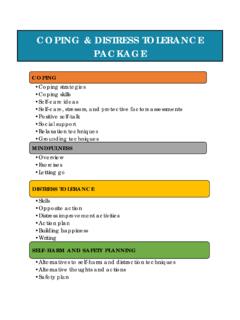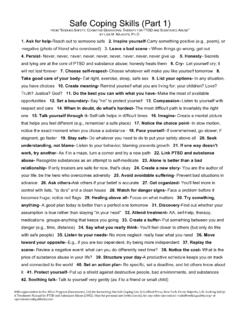Transcription of Skills for Life - Independent Living
1 Skills for life - Independent Living Contents Skills for life - Independent Living Programme 3.. Information about this resource 4.. Starting the group 7.. Delivering the programme one-to-one 11.. Session 1 Healthy eating and food hygiene 12.. Session 2 ( part 1) Budgeting 23. Session 2 ( part 2) Option 1 Internet & mobile safety 30. Option 2 Drugs and alcohol Option 3 Coping with loneliness .. Session 3 ( part 1) Becoming a tenant 48. Session 3 ( part 2) Education and employment Skills .. Session 4 ( part 1) Debt advice 58. Session 4 ( part 2) Sexual health and positive relationships .. Session 5 Celebration 68.. Evaluation tool Evaluation for carers / referrers 71.. Accreditation information 73.. Useful numbers and organisations in Hertfordshire 79.. Cooking together recipes (See additional PDF on CD). 2. Skills for life - Independent Living Session one Healthy Living and food hygiene Cooking together Leaving home/care information and support Session two Budgeting Skills Cooking together Healthy lifestyle choices Drugs & alcohol Online safety Coping with loneliness Session three Independent Living tenancy information Cooking together Education and employment opportunities Session four Debt advice Cooking together Sexual health and positive relationships Session five Celebration session Cooking together 3.
2 Information about this resource Session one Healthy Living and food hygiene Cooking is a recurring theme throughout this programme, with the young people preparing and cooking a meal together each session. As well as learning about basic kitchen hygiene and how to prepare food safely, there is a choice of recipes, including a vegetarian option, for all five dates. The facilitator version of these is towards the back of this pack. Additionally, as this course is all about developing young people's Independent Living Skills , there is a separate file on this CD-Rom that contains recipe sheets for all of the food cooked to download and print for each learner to take home and use. As well as recipes this contains some basic information about simple and healthy food to cook on a budget. The Skills learnt can be accredited using an AQA Unit Award Food handling and basic cooking Skills ' (86161), details of which can be found in the accreditation section.
3 Preparing to leave care This session should be facilitated by an outside speaker with expert knowledge of the leaving home/care process in Hertfordshire. This could be a social worker or Targeted Youth Support Personal Adviser, Foster Carers or Residential Home Workers. Session two Budgeting Budgeting is an important skill for all young people to learn, but for those leaving home/care it will be essential that they know how to manage their money effectively. The activities in this section offer a basic introduction to income and expenditure and how to set a basic budget for Independent Living . The Skills learnt can be accredited using an AQA Unit Award Budgeting Skills ' (78538), details of which can be found in the accreditation section. Healthy lifestyle choices Please be aware that both of the topics suggested for this section are too large to cover fully within the programme.
4 Instead, the pack contains two introductory workshops with activities that can either be used to fill one session, or woven in between other topics over the four sessions. If young people have particular issues, or need additional support, please ensure that the information is available to signpost them to other services. Option 1 Drugs and alcohol Suggested in this pack are some activities to offer information about drugs and alcohol and explore young people's values and attitudes to substance misuse. Information about additional services available to them should be handed out at the end of the meeting. 4. Option 2 Internet and mobile safety These session plans explore how young people use mobile phones and the Internet and aim to promote keeping young people safe online. Option 3 Coping with loneliness Being alone is different to the loneliness felt by many young people leaving home/care.
5 This session explores this and encourages young people to identify a network in the months leaving up to leaving home/care. Session three Becoming a tenant This is another session that should be facilitated by an outside speaker, this time one with expert knowledge of housing support and housing for Independent Living Group in Hertfordshire. This could include a social worker, Targeted Youth Support Personal Adviser or Herts Young Homeless Tenancy Support worker. Education and employment opportunities Contained in this section are activities to explore the Skills and qualities that employers and education providers look for in an applicant. They also explore young people's values and attitudes to working and the motivation to action plan for the future. There is an opportunity to work towards an AQA Unit Award, Introduction to action planning and goal setting' (73046), details of which can be found in the accreditation section.
6 Session four Debt advice For this session it is important that it is facilitated by an expert debt advisor, who can explain to young people leaving home/care about the dangers of getting into debt and raise awareness about where to go for financial help and support. Sexual health and positive relationships This section contains a selection of activities to raise awareness about sexually transmitted infections and promote positive relationships. There is no expectation that all of them will be facilitated, especially as time is so limited, but instead that facilitators will choose those most appropriate to meet the needs of the group. Information should be made available at the end of the session about sexual health services, support for the victims and perpetrators of domestic violence and general relationship advice available to young people in Hertfordshire.
7 This should include details of the local C-Card Scheme in the area and a an up-to-date copy of numbers u need. 5. Session five This session is a celebratory session that can be planned by facilitators to meet the needs of young people. If you plan an off-site trip then this will need to be organised using the standard HCC risk assessments and consent forms. In this pack it is suggested that the celebration session will be a final group meal, and there are recipes for cupcakes and a selection of sweet treats to make together to celebrate the end of the group. Recipes to use All of the recipes suggested for the cooking together' part of each session are included at the back of this pack in the section titled Cooking Together Recipes'. Cooking Together Recipes' are also available in a separate file to download and give to each young person so that they can make the food again once they are Living independently.
8 These have been designed as recipe sheets, and come complete with an ingredients list and additional facts and common tips for healthy eating. 6. Starti ng t h groupe Creating a successful learning environment This resource pack shows the Independent Living Programme facilitated over five four hours sessions, as per the pilot sessions run before the launch of this pack. These were set to coincide with mealtimes as preparing food and developing social Skills is a key feature of the group, and held between 11 3 (during school holidays) or 4 8 in term-time. However, each session has been written as a stand-alone module, with a choice of activities to explore each topic so that facilitators can choose those that meet the needs of the young people best. For young people with additional needs, or those who find it difficult to concentrate for long periods of time, it is suggested that each session is split in half to create 8 x 2hour sessions and one celebration session at the end.
9 Whilst this means that the group lifetime is longer, it may suit the learning needs of the young people better and result in better participation and retention. For the pilot the group took place in youth centres and community venues with full kitchen facilities. Whilst this has proved successful in bringing young people from different residential settings together, it is worth considering the option to facilitate the sessions in small groups where the young people actually live. This provides the benefits of on-site support and the option to deliver the training over a longer period, without the need to arrange transport or rely on young people to travel to the group independently. Referrals As this is a group that is open to young people by referral only, it is important for the success and welfare of the whole group that referrers are encouraged to give detailed information about the young people they are referring, within the boundaries of professional confidentiality.
10 This includes information and guidance about any . Additional learning support required Behavioural or emotional issues that require additional support Known relationships between the young people Known triggers' or coping strategies already in place for the young person This is especially important as some of the topics covered, relationships, online safety and bullying, are emotive and can result in young people needing additional support. If facilitators are made aware of potential difficulties then the programme can be adapted to ensure that these are taken into account and young people can get the most out of the sessions. Finally, whilst diversity enriches any group experience, it is worth considering the learning abilities of the young people within the group. If you have young people from both ends of the spectrum it is suggested that these differing needs are taken into account and more than one group run.






